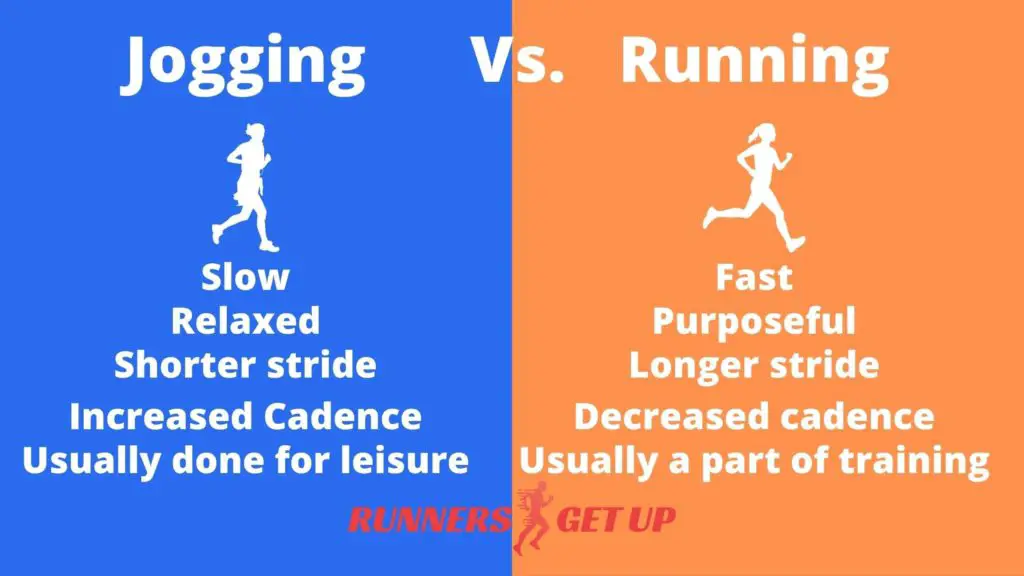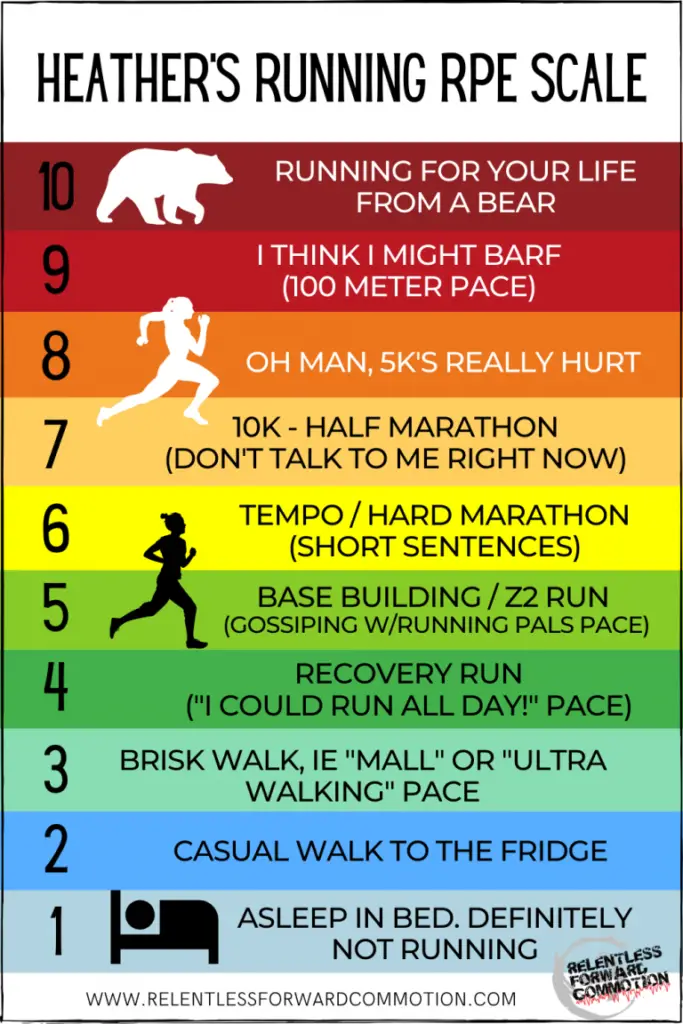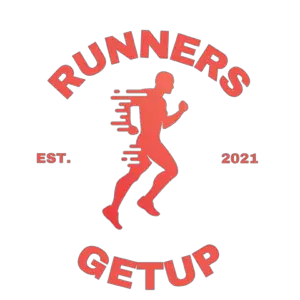This post contains affiliate links.

Depending on who you ask, jogging and running can mean the same form of activity—a continuous forward motion that is faster than walking. But why do people refer to them differently? What is the main difference between running and jogging? I’ve asked several coaches about their opinions on this and here’s what I found out.
The main differences between running and jogging are the pace and execution. Jogging is considered to be slower and more relaxed. An activity that is done as a form of leisure or daily exercise. While running is faster and purposeful. A term used by runners to describe a training session.
But that’s not all there is to it. There are a lot of differences between running and jogging like the speed, RPE, and the purpose of the activity. Ahead, we will draw a clear line as to what the main difference between the two is. In addition, I will share with you my thoughts on when you should run or when you should jog. Lastly, we will find out which among the two burns the most calories in case you want to use this information to lose weight.
The Difference Between Running And Jogging
Have you ever met someone who wouldn’t consider his/her jog a run? Or a competitive runner who got offended when you called his activity jogging? To someone who doesn’t have a background in the sport of running, those two things mean the same thing, however, running and jogging are different in terms of pace, execution, and purpose.

Jogging is a run at a slow and relaxed pace. You should be able to maintain a conversation while running at this pace. Usually, people who jog don’t have a specific pace to maintain or distance to cover. They do it as a form of leisure rather than training. They run often but don’t follow a training plan.
People who use the term “jogging” usually do it as a form of leisure or a form of daily exercise.
On the other hand, running is considered to be purposeful. It’s usually the term used by runners to describe a training session. In most cases, there is a clear goal of distance or time, and it follows a training plan.
Let me put it this way: I’m sure you’ve heard the phrase “Stop working out and start training”. Well, in this case, jogging is working out, and running is training.
At What Pace Does Jogging Become Running?
Most sources drew a line at 6 mph as the speed that separates joggers from runners. According to a number of sources, jogging is considered to be running at the speed of 6 mph or slower, while running is anything faster than 6 mph. However, I do not agree with this generalized rule. It’s important to point out that running at 6 mph might not be “slow and relaxed” for most people.
Imagine this, if you “jog” at 6 mph, that is the equivalent of a 10-min mile pace. Therefore, jogging at 6mph will allow you to finish a 5k race in just a little over 30 mins which is a reasonable goal but already requires a lot of effort for a beginner. In other words, if you’re a beginner, 6 mph should already be considered as “running” because you are no longer running at a relaxed pace.
A better way of identifying whether someone is running or jogging is by using the rate of perceived exertion, also known as the RPE. It is a subjective score that a runner will give to describe the intensity level of his/her workout according to his/her own unique fitness level. That way, the runner’s unique fitness level can be put into consideration.
Using RPE To Determine Whether You’re Jogging Or Running
The RPE is a useful tool used in the medical field as well as sports, but the original Borg rating of perceived exertion explains very little on how to use it specifically for running.
However, I found a clear infographic created by Coach Heather Hart, co-founder of Hart Strength and Endurance, that better explains each RPE rating relative to running pace.

Based on the RPE scale, we can consider jogging as RPE 4 or 5 where you feel like you can run at that pace all day and maintain a conversation with your pals.
Running is around RPE 6 where the run is just starting to feel hard to an RPE 8 which is the typical 5k pace. Anything more than RPE 8 is already considered a sprint.
You can find more about the use of RPE and other training methods on her site relentlessforwardmotion.com.
Jogging Is Like An Easy Run (But Not The Same)
So if jogging is a slow and relaxed run and around the RPE of 4 or 5, isn’t it the same as what runners call an “easy run”? Partly, it is. But it isn’t the same.
Jogging is a term used by people who weren’t exposed to the running community as much. They are the aunts and the uncles who hit the pavement early in the morning for 15-45 mins before they start their day. The beginner who wants to start their fitness journey by doing the most accessible exercise.
It is the natural pace run by most people who just want to get the health benefits of daily exercise. When you ask joggers at what pace they’re planning to run, they usually have no idea. Most of them aren’t even following a training plan. They treat running as a form of leisure the same way cyclists treat biking around the town different from cycling for training.
Easy runs, on the other hand, is the term used by runners to describe a pace that takes the least toll on the body. A paced used by runners to recover from yesterday’s hard session. Or a pace used by a runner who’s trying to increase his/her weekly mileage by stacking up more miles but running at a more relaxed pace to avoid burnout.
In other words, easy runs serve a purpose within the program, usually to recover or to stack more miles.
(Related: The Ultimate Guide On How To Vary Your Runs)
But in terms of running pace and RPE, both a jog and an easy run mean the same thing—running at a slow and relaxed pace.
Speaking of stacking up miles, do you ever wonder how many miles do runners run a week? You can check out this article to find out.
Is It Better To Run Or To Jog?
Both running and jogging serve a different but equally important purpose, therefore, it isn’t appropriate to say that one is better than the other. But, if we classify them to what is better for who, we can get a better understanding as to who should do running and who should do jogging.
As a general rule, running is better for improving overall fitness and athletic performance. Athletes and fitness enthusiasts will benefit most from having a running program. On the other hand, jogging is a better introductory workout for those who are just starting out or those who just want to enjoy the health benefits of physical activity.
You can also run or jog depending on your current situation. As mentioned below, there are instances where jogging is actually better than running while there are also instances where running is better than jogging.
When Is It Better To Jog?
- When returning from an injury: When you’re returning from an injury, it’s best not to put a number on how many miles you should run or at what pace you should run it. Instead, just jog and see what is tolerable.
- When you’re taking a break from serious training: There will be times where it’s actually beneficial to let go of the gas pedal after a serious training—typically after a marathon or an ultramarathon. Jogging will allow you to maintain your fitness but still give you the physical and mental rest you need.
- When you’re just starting out: Jogging is a great way to build your aerobic capacity. In addition, it’s easy enough that you are more likely to do it more consistently.
- When you’re overweight: When you run, your joints receive the impact 3-4x your bodyweight. Therefore, if you’re overweight, it’s better to jog, get your form right, and lose a few pounds before signing up for a training program.
When Is It Better To Run?
- You’re training for a race: Becoming a better runner requires you to improve on two fronts—aerobic and anaerobic systems. Running at different paces with a structured program allows you to tackle both energy systems so you can be a better runner.
- You’re training for a sport: If you’re involved in any sport that requires speed and endurance, then jogging won’t get you there. Having a good program is the only way to improve your performance.
- If you’re serious about performance: Although running and jogging both have positive health benefits, only running will get you to the next level in terms of performance.
What Burns More Calories?
As a general rule, the harder you work, the more calories you burn. Running at a faster pace is harder and it requires more energy, therefore, running burns more calories than jogging. However, running fast will also tire you faster resulting in less time spent working out. In addition, you may experience muscle soreness that will prevent you from training the next day.
So if you’re a beginner looking to lose weight, you should aim for an exercise routine that you can do consistently. That said, jogging for 30-45 mins a day for 5 days a week might be a better weight loss strategy than running hard for 20 mins 3 times a week.
Final Thoughts
As mentioned earlier, both running and jogging serve a different but equally important purpose. Whether you should run or jog is up to you and the situation you are in. Don’t box yourself into the idea that runners shouldn’t jog or jogging is a weak form of running.
The more important thing is that you are doing physical activity and that you are taking good care of your health.

